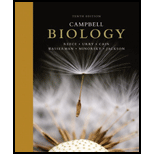
Concept explainers
What does it mean wheti we say that the two DNA strands in the double helix are antiparallel? What would an end of the double helix look like if the strands were parallel?
To explain: The meaning of the statement “the two strands in the double helix DNA are antiparallel”.
Introduction: DNA is a double-stranded molecule that consists of two strands of nucleotides. The bases in one strand are complementary to the bases on the other strand. During DNA replication, the two strands of parent DNA molecule separate. The parent strands act as templates along which the DNA polymerases add up the complementary base pairs in the context of base-pairing rules.
Explanation of Solution
A deoxyribonucleic acid (DNA) molecule consists of two polynucleotide chains that associate as a double helix structure. The polarity in the DNA chain is referred to as 5ʹ end and the other as 3ʹ end. One end of DNA consists of a phosphate attached to a 5ʹ deoxyribose carbon (5ʹ end), and the other end has a hydroxyl group that is attached to a 3ʹ deoxyribose carbon (3ʹ end). The nucleotides are linked by phosphodiester bonds through 5ʹ-P of one sugar and 3ʹ-OH group of the next sugar. In a double-stranded DNA, one strand is “complemented” by the other strand. If one DNA strand runs in the 5ʹ→3ʹ direction, its complementary strand would run in the 3ʹ→5ʹ direction. Thus, the two strands are antiparallel to each other.
To determine: The ends of a double helix DNA if the two DNA strands in the double helix were parallel.
Introduction: DNA or deoxyribonucleic acid carries hereditary information from one generation to another. DNA replication is a process that takes place in every biological cell. It involves the coping and producing of two identical copies of a cell from their parent DNA molecule.
Explanation of Solution
If two DNA strands run in parallel directions, they would run in the same direction, that is, they would both run in the 5′→3′ direction. In such a condition, in the same side, an end of the DNA molecule would have two 5′ ends and two 3′ ends.
Want to see more full solutions like this?
Chapter 16 Solutions
Campbell Biology (10th Edition)
Additional Science Textbook Solutions
Applications and Investigations in Earth Science (9th Edition)
College Physics: A Strategic Approach (3rd Edition)
Laboratory Manual For Human Anatomy & Physiology
SEELEY'S ANATOMY+PHYSIOLOGY
Biology: Life on Earth with Physiology (11th Edition)
Chemistry: A Molecular Approach (4th Edition)
- 4.arrow_forward2arrow_forward1. 2. 3. Marine fish cells are hypotonic compared to their seawater environment; their cells lose water by osmosis and gain solutes. If you add heterotrophic respiration and autotrophic respiration together and then subtract that value from gross primary productivity, then you have a more refined estimate of ecosystem carbon storage than NEE. Differential heating due to the earth's tilt generates the global wind AND oceanic circulation patternsarrow_forward
- KD 200- 116- 66- Vec ATF6 (670) ATF6 (402) ATF6 (373) ATF6 (366) I I 45- 1 2 3 4 5 ATFG (360) (e/c) 9V ATFG (402) g ant- ATF anti-KDEL DAPI barrow_forwardWestern blot results: what information can you get? Presence of proteins of your interest Levels of protein expression Levels of protein activation (must use activation state-specific antibody) Decreased function of the ATM kinase in aging mice. A C57BL/6 female 6 month Con IR 20 month C57BL/6 male 6 month 28 month Con IR Con IR Con IR p-ATM (S1981) ATM P-p53 (ser18) Actinarrow_forwardDoes it show the level of proteins? What about the amount? Levels of protein activation? How can you tell? Does the thickness tell you anything? What about the number of the lines?arrow_forward

 Human Heredity: Principles and Issues (MindTap Co...BiologyISBN:9781305251052Author:Michael CummingsPublisher:Cengage Learning
Human Heredity: Principles and Issues (MindTap Co...BiologyISBN:9781305251052Author:Michael CummingsPublisher:Cengage Learning Biology Today and Tomorrow without Physiology (Mi...BiologyISBN:9781305117396Author:Cecie Starr, Christine Evers, Lisa StarrPublisher:Cengage Learning
Biology Today and Tomorrow without Physiology (Mi...BiologyISBN:9781305117396Author:Cecie Starr, Christine Evers, Lisa StarrPublisher:Cengage Learning Biology: The Dynamic Science (MindTap Course List)BiologyISBN:9781305389892Author:Peter J. Russell, Paul E. Hertz, Beverly McMillanPublisher:Cengage Learning
Biology: The Dynamic Science (MindTap Course List)BiologyISBN:9781305389892Author:Peter J. Russell, Paul E. Hertz, Beverly McMillanPublisher:Cengage Learning BiochemistryBiochemistryISBN:9781305577206Author:Reginald H. Garrett, Charles M. GrishamPublisher:Cengage Learning
BiochemistryBiochemistryISBN:9781305577206Author:Reginald H. Garrett, Charles M. GrishamPublisher:Cengage Learning Biology 2eBiologyISBN:9781947172517Author:Matthew Douglas, Jung Choi, Mary Ann ClarkPublisher:OpenStax
Biology 2eBiologyISBN:9781947172517Author:Matthew Douglas, Jung Choi, Mary Ann ClarkPublisher:OpenStax





